Almond butter is an energy-dense snack made by pressing and grinding almonds, much like you would press and grind peanuts for peanut butter.
Almond butter is attractive to many health food enthusiasts because of its excellent content of healthy fats and the deep pool of scientific research that backs the health benefits of almonds.
Many people prefer almond butter to peanut, for taste, allergy, or health reasons—peanuts don’t have nearly the same high-quality fat profile of almonds.
Whatever the reason, if you want almond butter, you want a brand that’s high quality. Our researcher team has ranked the ten highest-quality almond butters with the best nutritional content.
Research
Rankings
1. Almondee California Almond Butter
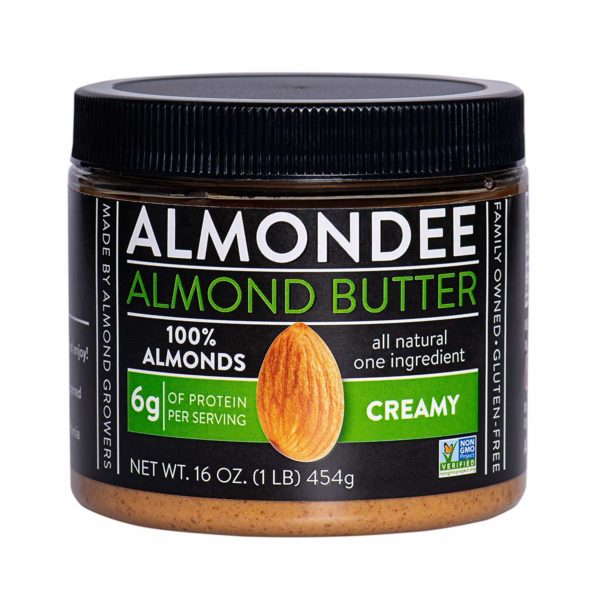
Almondee California Almond Butter plays to the local crowd, using only California-grown non-GMO almonds in their manufacturing process.
On top of that, almonds are the only ingredient, making this a very solid almond butter. With no salt, no sugar, and great texture, it’s our number one pick.
2. Barney Butter Almond Butter
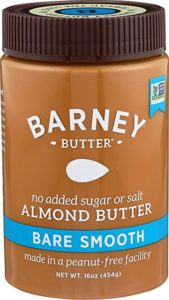
Barney Butter Almond Butter is a favorite among health food enthusiasts and people with a peanut allergy alike.
It’s made in a totally peanut-free facility, and its only two ingredients are almonds and palm oil.
3. Kirkland Signature Almond Butter
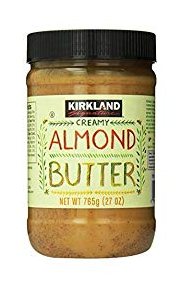
Kirkland Signature Almond Butter is about as pure as you could ever get. There’s exactly one ingredient in this almond butter: almonds. No palm oil or anything else. If you’re a nut butter purist, this is a great choice.
4. Artisana Organics Raw Almond Butter
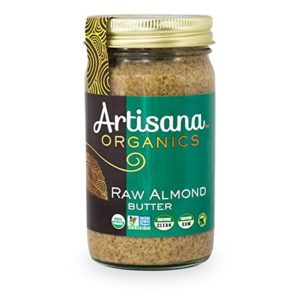
Artisana Organics is the best of the organic almond butter options. To keep the almonds as raw as possible, Artisana Organics uses low-temperature grinding, though one byproduct of this is that the almond butter does need a good bit of stirring to mix the oil back into the solution.
5. Wild Soil Almond Butter
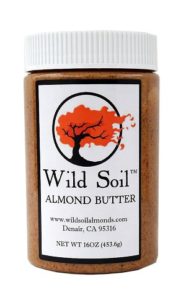
Wild Soil is a smaller company, but it produces a high-quality almond butter from almond trees grown at a small orchard in California. If you want to support a small farm with a good product, this is a good call.
6. Georgia Grinders Almond Butter
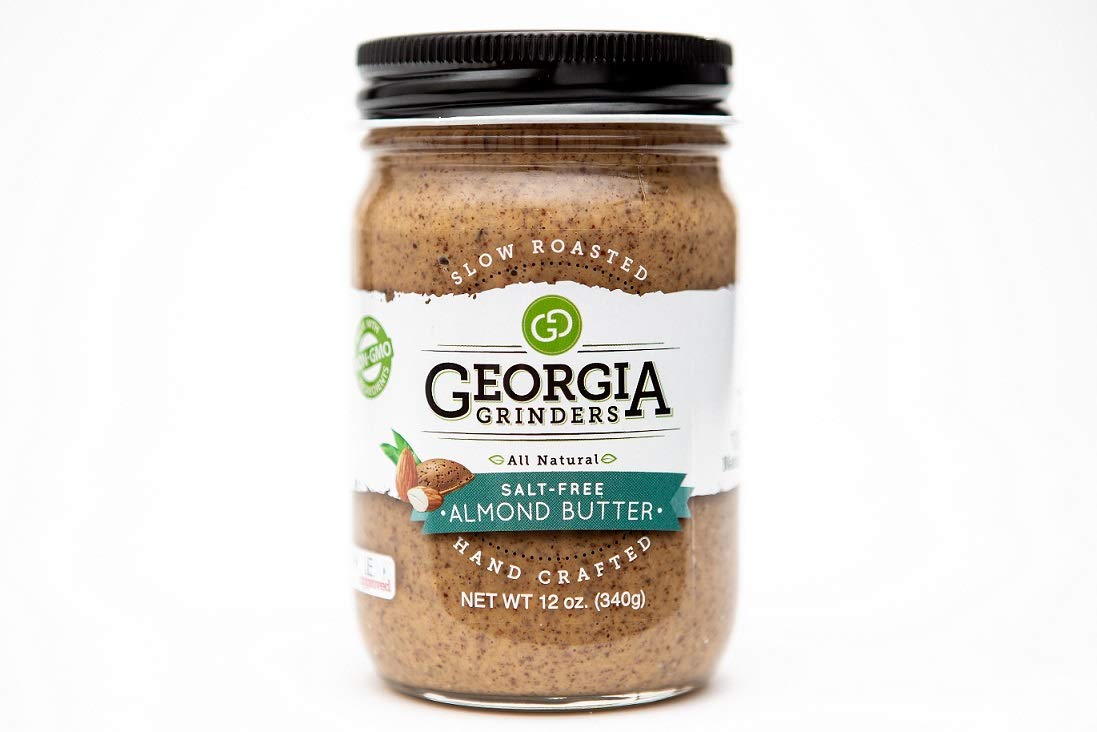
Georgia Grinders is a super-simple almond butter with just one ingredient: almonds. It’s slightly crunchy, not totally smooth, which gives it a distinctively different feel than some of its competitors.
7. Trader Joe’s Creamy Almond Butter
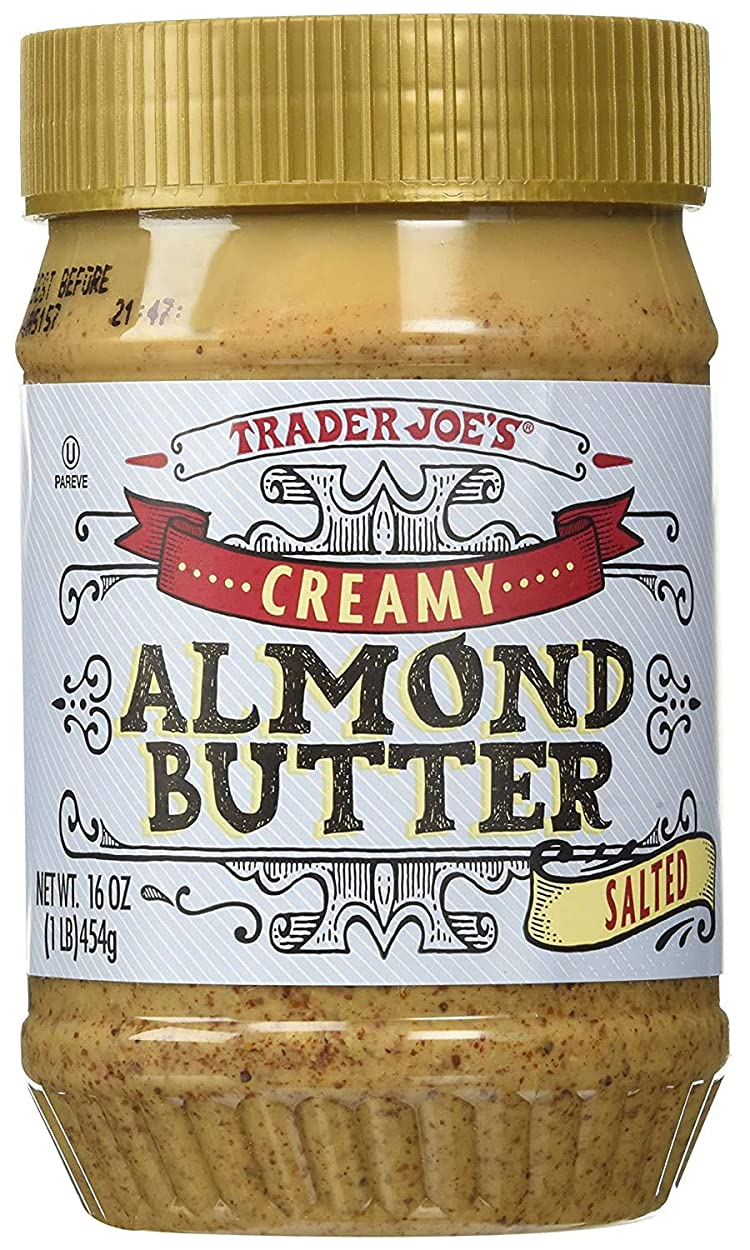
Trader Joe’s makes a great-tasting almond butter that’s easy to spread as well. The only downsides are the additional salt that’s added.
8. Jiva Organics Raw Sprouted Almond Butter
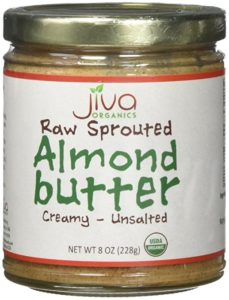
Jiva Organics uses almonds that are both grown organic and used raw and sprouted. This means that this almond butter has a distinctively “green” and sweeter flavor to it than almond butter made from roasted almonds, as most other almond butters are.
This different taste is a little polarizing, but plenty of people love it. If you are looking for something with a taste that’s a little different from the usual almond butter, give Jiva Organics a shot.
9. Julie’s Real Almond Butter
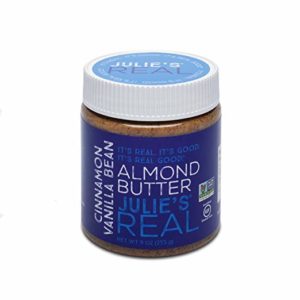
Julie’s Real Almond Butter keeps things natural, but puts a unique twist on regular almond butter by flavoring it with honey, cinnamon, and vanilla beans.
While the honey adds a bit of sugar, the amount is pretty trivial—just three grams per serving. Strict zero-sugar dieters will want to look elsewhere, but if you are looking for something with a little sweetness and spice to it, Julie’s Real Almond Butter is worth a try.
10. Dastony Organic Almond Butter
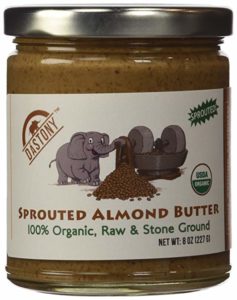
Dastony Organic Almond Butter is organic, which is a big plus. However, their quality control isn’t the greatest, and there seems to be a lot of oil relative to almond in this almond butter, as many users find that the oil separates and becomes very soupy.
Who should buy almond butter?
Almond butter is safe for most individuals and is a great source of nutrition that helps promote heart health and lower cholesterol. It’s also great for people with pre-diabetes as it helps to improve glucose control.
Almond butter is generally considered safe for special populations such as pregnant women and children.
Category winners
Best almond butter overall: Almondee Almond Butter
Almondee is the most versatile option on our list, thanks to its simplicity in design—there’s just one ingredient, and it’s almonds. No added oils, salts, or sugar take away from the health benefits of this almond butter.
Best organic almond butter: Artisana Organics Raw Almond Butter
Organic almonds are hard to come by, but Artisana Organics pulls it off, with a raw, organically-certified almond butter that’s the best option out there for people concerned about the purity of the ingredients in their almond butter.
Best almond butter for keto diet: Barney Butter Almond Butter
Barney Butter Almond Butter is super smooth, easy to spread or add to smoothies, making it a fantastic choice for people on the keto diet who want to incorporate almond butter into a wide range of foods.
Best almond butter for weight loss: Almondee Almond Butter
Want to take advantage of the filling effects of the healthy fats in almond oil? Our pick is Almondee, thanks to its 100% pure formulation (no added vegetable oils here) and lack of added salt, which can compound some of the health problems that come along with being overweight.
Best bulk almond oil: Kirkland Signature Creamy Almond Butter
Unlike peanut butter, it’s a bit trickier to get bulk quantities of almond butter, especially if you’re looking for a high-quality product. Fortunately, Kirkland Signature sells bulk-sized batches of almond butter, albeit in three-packs of 27-ounce jars. Still, given the excellent quality of the almond butter, it’s the best bulk choice out there.
Best almond butter without palm oil: Almondee Almond Butter
Our best overall pick is also our recommendation if you’re looking for almond butter without added palm oil. While palm oil makes almond butter easier to spread, it also dilutes the healthy fats in almonds, so the single-ingredient almond oil from Almondee is your best bet in this scenario.
How we ranked
Almond butters come in 3 main forms: sprouted, raw, and roasted. For our rankings, we had a slight preference for raw almond butters, like Datsony Organic, as more of the nutrients stayed alive.
Products like Artisana Organics ranked a little higher for used low-temperature grinding to keep it as raw as possible. Pure sprouted products were generally avoided due to their awkward taste, but we did include raw and sprouted mix products like Jiva Organics, for offering a good taste, while staying as far as possible. Roasted products, like Wild Soil, ranked well for providing an exceptional taste.
Next, we looked at the added ingredients. Our top products, like Kirkland, were generally free of added oils, sugars, and salts. We did make exceptions for some products like Barney, which included small amounts of palm oil. Barney also ranked high for being processed in a peanut-free facility, which ensured purity and no cross-contamination.
Lastly, we looked for almond butter that was both organic and non-GMO certified. Having both of these labels was the only way we could be safe that the least amount of pesticides would end up in our bodies. Almondee California took the top spot for providing a non-GMO almond butter, with just one ingredient: almonds.
Benefits
The beneficial fats in almonds are good for heart health. Almond butter is full of oils from pressed and crushed almonds, and these oils have significant benefits for your cardiovascular well-being.
One study that directly demonstrated this was published in 2014 in the British Journal of Nutrition (1). In it, researchers had 27 adults with high blood lipids (a well-established risk factor for heart disease) consume one of three snacks during the course of three one-month trial periods.
These snacks contained 100 grams of almonds, 50 grams of almonds, or zero grams of almond, and the order was randomized.
The researchers tracked how the blood biomarkers of cardiovascular disease risk changed as a function of the dietary intake of the subjects during their various one month trial periods.
They found that the highest dose of almonds was associated with a significant increase in oleic acid and monounsaturated fatty acids in the blood; both of these findings are linked to a lower risk of cardiovascular disease over the next ten years.
Randomized clinical trials have shown that almonds can lower your cholesterol. One study published by researchers at Penn State University looked at cholesterol levels, another strong indicator of cardiovascular disease risk (2).
The study randomized nearly fifty people into two groups, one of which consumed 1.5 ounces of almonds per day as a snack in addition to their usual diet, while the other consumed a muffin with an equal amount of calories. This continued for six weeks, after which the groups were switched.
The researchers found that cholesterol, particularly LDL or “bad” cholesterol, was reduced when the subjects were eating almonds instead of the muffin snack. Interestingly, the researchers also found that almonds were associated with a reduction in body fat stored in the abdomen, indicating that almonds may have a more general positive metabolic effect.
Almonds can improve blood sugar control in people with prediabetes. Prediabetes, which is characterized by high blood sugar and poor insulin, affects millions of people, so a team of researchers in New Jersey decided to investigate whether almonds could improve prediabetes (3).
Their rationale was based on results from observational studies, which indicated a possible link between almond consumption and better blood sugar control.
Their study was quite intensive: subjects with prediabetes were split into a control group, which followed the American Diabetes Association recommended diet, and an experimental group, which followed the same diet except that 20% of the calories were replaced with almonds. Both groups were followed over the course of 16 weeks.
The researchers reported that the almond-rich diet had greater improvements in their insulin sensitivity as well as lowered LDL cholesterol.
This second finding is not surprising, as we’d seen the same result in other studies specifically focused on almonds and cardiovascular disease risk.
The most important takeaway from this study is that even a huge amount of almonds in your diet appears to be healthy: Fully one fifth of the caloric intake of the experimental group in this study consisted only of almonds.
Moreover, they weren’t being compared to a control group on their own diet; this high-almond diet was compared to a dietary plan approved by the American Diabetes Association.
Almonds won’t cause you to gain weight. If you believe that weight loss is simply a matter of calories in versus calories out, you’d think that adding a substantial quantity of almonds to your diet would inevitably lead to weight gain, thanks to their high energy density and fat content.
A study published in 2007 by researchers at Purdue University tested this proposition by recruiting 20 women for a cross-over study (4).
Half the women added 350 calories of almonds to their diet every day for ten weeks, with no other dietary alterations. The other half maintained the same diet. After ten weeks plus a three week washout period, the groups switched, and the control group started eating almonds while the experimental group stopped.
After analyzing the results, the researchers were were surprised—eating almonds was associated with no change in body weight. The researchers showed that this occurred because of (presumably unconscious) reductions in intake of other foods.
This finding makes the long term health benefits of almonds even more attractive, as their high energy density won’t have negative consequences for weight gain.
Almond butter can reduce DNA damage. Smoking is definitely bad for your health, but some people can’t resist. These smokers suffer a lot of oxidative damage to their DNA as a result of the smoke particles, and this damage is thought to be the primary cause of many of the diseases that smokers suffer.
For researchers, smokers are also a good model for ways to reduce oxidative damage: interventions that reduce oxidative damage to DNA in smokers might work in nonsmokers people too, since they experience oxidative damage as well, albeit at a lower rate.
This is why antioxidants like goji berries and green tea are so intently studied for their health benefits. Almonds, thanks to their high content of antioxidants, have been studied in this context, using cigarette smoking as a model for oxidative damage to DNA.
A study published in 2007 in the Journal of Nutrition used a randomized cross-over design to study the effects of almonds on levels of DNA damage in a group of smokers (5).
The subjects were randomly assigned to add either 84 grams of almonds or 120 grams of pork per day and were studied over the course of four weeks. The researchers found that almond intake was associated with a 23-34% decrease in DNA strand breaks compared to pork, indicating that almonds could be a good way to protect DNA from oxidative damage.
While this study was conducted in smokers, it’s promising for everyone, as we all deal with varying amounts of oxidative damage on a regular basis.
Recommended intake
Most research on almonds and almond butter has used daily intakes commensurate with one or two almond-based snacks per day.
This works out to 1.8-3.5 ounces (50-100 grams) of almonds or almond butter per day, which works out to roughly 300 to 450 calories.
Eating this amount of almonds or almond butter on a daily basis is the right intake to get all of the benefits of almonds, like better heart health and lower cholesterol, without any weight gain. Even higher almond intake might be even more beneficial, but only a small number of studies have examined very almond-heavy diets (through the results are positive).
The only thing to watch out for is heavily salted almond products—these could raise your blood pressure if you eat a lot of almonds, as a result of their sodium content.
However, all the top-ranked almond butters we’ve reviewed have little or no salt added, so you won’t have to worry about that with a highly ranked almond butter.
FAQ
Why is almond butter considered healthy? Almond butter is a popular health food thanks to its beneficial fat content, high nutrient density, and positive long-term effects on your risk factors for chronic disease. Even though it’s an energy-dense food, it’s not going to make you gain weight like processed snack foods that are high in sugar and low in carbohydrates.
Does raw almond butter or roasted almond butter last longer? Raw almond butter should last longer than roasted almond butter.
Where do almonds come from? Almonds are a tree nut from a tree native to Iran. However, the almond tree is now cultivated widely around the world.
How long can I keep almond butter for? Almond butter should be immediately stored in your refrigerator. The average shelf life for almond butter is around six months, so watch for an oily or paint-like smell, which may indicate that your almond butter has expired. Also, watch for the formation of rust on your almond butter. If this occurs, do not use it. If you notice an oily surface on the top of your almond butter, this is the natural oil separation process. Simply stir to regain consistency.
Does it matter how my almond butter is packaged? It is important to remember that glass jars do not leach small plastic particles into their contents when they are heated. It has been suggested that when leached plastic particles enter the body through the consumption of food products, they can cause metabolic or hormonal disruptions. As such, you should always try to use glass containers. If you must use a plastic container, ensure it is always stored in a cool place.
What does stone ground almond butter mean? Stone grinding means that almonds have been ground under pressure using granite wheels, a centuries-old system. Stone grinding typically retains the whole nut, and many argue that stone grinding allows for the full retention of the nut’s flavor and nutritional value due to the simpler process. Stoneground almond butter may also allow for a smoother consistency.
What are sprouted almonds? Sprouted almonds are almonds that have been soaked in water for enough time to allow for the almond to “sprout.” This means that the enzyme inhibitors contained within the almond are activated, allowing for the almond’s complete nutritional potential to be realized. Many find that sprouted almonds are easy to digest. It is suggested that sprouted almonds are sweeter than non-sprouted almonds.
What does it mean if the almond butter has been pasteurized? Many almond butter brands have been pasteurized because the United States Department of Agriculture passed a law in 2007 that required all almonds sold in commercial settings to have gone through pasteurization. This was an effort to avoid consumers getting sick from almond butter that has been contaminated by salmonella.
In order to pasteurize, the almonds are put under steam for a brief 60 seconds, which reaches the surface layer of the almond but not the interior meat. This does not result in any significant loss in the nutritional value of the almonds. If almond butter contains “raw” know that this is an unregulated term and that many brands use the term raw to indicate that their almonds, while pasteurized, have not undergone any other heating processes.
How do I soak almonds? Many consumers find that soaked almonds are easier to digest because the soaking process breaks down the fibers. To soak your almonds, place your almonds in enough water to cover for up to eight hours. Place in the refrigerator if you are leaving the almonds to soak overnight. Once you have finished soaking the almonds, drain in a colander, and then rinse with clean water thoroughly.
How can I make my own almond butter? Homemade almond butter is simple to make if you have a high-speed blender or a food processor. The addition of other ingredients such as sea salt, sugar, or other flavors is optional. Use raw or roasted almonds. It is also an option to use organic or inorganic almonds. First, use the blender or food processor to break the almonds into smaller pieces or chunks. Then continue to blend the almond pieces.
Once the natural almonds release their natural oils, the blended almonds will begin to resemble crumbs. Once you have a crumbly mix, turn off the blender or food processor, scrape down the sides, then continue to blend until you have reached the consistency you want. Depending on your preference, you can make smooth or crunchy almond butter. If you prefer roasted almond butter, roast raw almonds on a baking sheet for eight to ten minutes at 350 degrees. Remove the tray from the oven and allow the almonds to cool prior to the blending process.
Can almond butter replace butter in baking? For converting regular recipes to vegan recipes, almond butter can be an excellent replacement for regular butter. This is due to the high fat content of almond butter when compared with regular butter.
Does almond butter freeze? You can freeze almond butter, but it won’t freeze fully due to the oil content. However, it is an excellent way to keep your almond butter fresher until you get around to using it.
Does almond butter cause acne? Almonds are high in omega-6 acids. Interestingly, these acids may cause acne or skin inflammation.
Is almond butter good for weight loss? Because almond butter is full of good fats, protein, and fiber, it may help an individual lose weight. However, weight loss depends on a variety of factors. You must ensure you adopt healthy and sustainable lifestyle habits to lose weight.
What is almond butter food for? Almond butter can be used in a variety of ways. It can be used on sandwiches and toast, as well as in dips, dressings, sauces, soups, or even desserts.
What almond butter is best for the keto diet? Almond butter with a higher fat and protein content would be best for the keto diet since this diet focuses mostly on consuming fat and protein macronutrients.
Can almond butter cause digestive issues? Almond butter may cause some individuals to experience digestive upset, such as constipation, gas, or diarrhea.
Are almonds considered nuts? While almonds are frequently referred to as nuts, it is actually a drupe fruit from the almond tree. The almond consists of an outer hull and a hard inner seed.
Why is almond butter so much more expensive than other nut butters? California produces about 80% of the world’s almonds. Due to various droughts, the price of almonds and almond butter is higher.
Can almond butter cause bloating? Yes, almond butter can cause bloating. Many individuals experience digestive problems with nuts, including almonds.
Can almond butter be used for more than just food? Yes, almond butter can be used for more than just eating. Interestingly, many individuals use almond butter as a hair mask. They claim that it can help moisturize dry hair and scalp. Other individuals have claimed it can help improve dark circles under the eyes and even be used as part of an all-natural and at-home face mask.
Which almond butter should I buy? The best way to find out which kind of almond butter you prefer is to try them out.
Does almond butter go bad if left out of the fridge overnight? Almond butter won’t go bad overnight. You would likely have to leave it out for several days or weeks for the almond butter to go bad.
Is almond butter healthier than peanut butter? Both of these nut butters have similar nutrients and caloric amounts. Yet, peanut butter does have a higher protein content.
Is there supposed to be oil on the top of the almond butter? Yes, oil at the top is normal. Before you use it, stir it to mix the harder portion of the butter with the oil. This will give it a more creamy texture, which helps if you intend to spread it on bread or toast.
What does almond butter taste like? Almond butter tastes like almonds. It’s considered fairly mild in flavor, with a bit of sweetness, similar to that of peanut butter.
What is the healthiest type of almond butter? Most almond butters have similar nutrient contents. As such, both raw and roasted almond butter are considered healthy.
How much protein is in almond butter? About 100 grams of almond butter contains 21 grams of protein.
Are there different kinds of almond butter? Almond butter comes in smooth, crunchy, and stir or no-stir varieties. It can also be raw or roasted.
Related Articles
Recap
Almond butter is a great way to take advantage of the health benefits of almonds. When paired with a healthy snack like apple slices, it’s an excellent route to lower cholesterol, better blood lipid profiles, less oxidative DNA damage, and greater cardiovascular health, all without any weight gain.
This may be surprising, given the high caloric content of almonds, but thanks in part to their high fiber content, not all of these calories are absorbed.
A 50 to 100 gram serving of almond butter on a daily basis is a great all-natural way to pave the path towards better long-term health.
For BodyNutrition’s #1 recommended almond butter, click here.